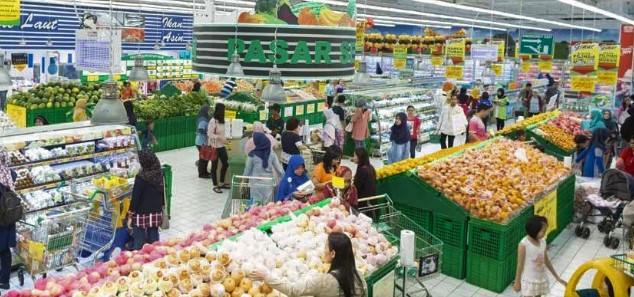Indonesia's Purchasing Power, Retail Sales & Consumption on the Rise
There are signs that household consumption in Indonesia is rebounding ahead of this year's Idul Fitri holiday. This would be a great boost for Indonesia's overall economic growth as private consumption accounts for around 57 percent of the nation's total economic growth. One of the reasons why Indonesia's gross domestic product (GDP) growth has been stuck around the 5 percent (y/y) mark in recent years is subdued household consumption (which has fallen slightly below the 5 percent y/y mark).
Roy Mandey, Chairman of the Indonesian Retailers Association (Aprindo), said he expects a 20-25 percent (y/y) rise in retail sales during this year's Idul Fitri period, supported by discount actions in malls (for products such as clothes, shoes, and jewelry) as well as low prices of staple foods (such as chicken meat, beef and chili). Also the disbursement of holiday bonuses and civil servants' 13th month wage strengthened people's purchasing power and therefore trigger rising consumption. Meanwhile, stable food prices come on the back of the government's decision to open the gates to imports of items such as rice, sugar, meat, packaged cooking oil, and fuel.
This year, the central government allocated IDR 35.76 trillion (approx. USD $2.6 billion) for the 13th month salary and holiday bonuses for civil servants. Meanwhile, the government also raised expenditures on social assistance programs, including the village funds, cash transfers under the Family Hope Program and the rice-for-the-poor program. This is also regarded a tactic by the government to make itself more popular ahead of the 2018 local elections and 2019 presidential and legislative elections. Earlier the government had promised to leave subsidized fuel and electricity prices unchanged until late-2019 in an effort to improve people's purchasing power. However, considering global crude oil prices have risen, this policy adds pressures on the budget deficits.
But it does lead to improving household consumption. This would be in stark contrast to weak retail sales growth in the Ramadan and Idul Fitri period last year when sales only rose 5-6 percent from sales in ordinary months. As a result of weak Ramadan sales in 2017, Indonesian retailers saw their full-year 2017 earnings grow by a modest (average) 3.65 percent (y/y), their worst performance over the past decade.
Meanwhile, data from Indonesia's central bank (Bank Indonesia) shows that retail sales have been accelerating strongly in Indonesia since January 2018 (see the table below). Indonesian retail sales grew 4.1 percent (y/y) in April, a ten-month high, supported by sales of automotive fuels, food, beverages and tobacco.
Retail Sales (y/y) Indonesia:

Another Bank Indonesia survey shows that the Consumer Confidence Index rose 2.9 points in May 2018 to a reading of 125.1, nearly touching a three-year peak. Data indicate that Indonesian consumers have started to spend more of their incomes with the average income-for-consumption ratio slightly growing to 66.1 percent from 66.0 percent the previous month, while the income-for-saving ratio declined to 19.6 percent from 20.0 percent.
Another indication that more money is circulating in the Indonesian economy is a report that was released by Nielsen Advertising Information Services. The report states that advertising spending rose 7 percent in Indonesia during the 2018 Ramadan (compared with the same period one year earlier). More spending on advertising could trigger heightened consumption as people are encouraged to purchase the products or services that are being advertised. Moreover, during the Ramadan month the Indonesian government and some private companies reduced office hours and therefore people have more time to spend at home or to go shopping.

Also interesting is that the total number of Indonesian people watching TV rose 18.6 percent to 7 million per day in the 11 biggest Indonesian cities between 16-21 May 2018, compared with 5.9 million per day in the period between 1-7 April 2018. Advertisers responded to this by raising spending on TV adverts, Nielsen noted.
Considering private consumption is expected to grow further in Indonesia on the back of the 2018 local elections, 2018 Asian Games (in Jakarta and Palembang), and the IMF-World Bank meeting on Bali, Indonesia Investments is optimistic that our forecast for full-year 2018 GDP growth - which we set at 5.2 percent (y/y) - can be achieved after a slow start (albeit one that was in line with our estimate) in Q1-2018 when the Indonesian economy grew 5.06 percent y/y.
Bahas
Silakan login atau berlangganan untuk mengomentari kolom ini
